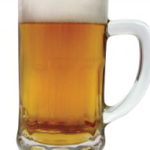Drinking at Work, A Good Idea

When I was in engineering school, my friend Phyllis and I were tasked with a project for an electronics class. I thought a robotic back scratcher was a good idea. Phyllis wanted to build a sobriety tester, so that our research would involve collecting data at the bars at night.
We chose her idea.
So we built a small metal box with a pair of buttons and corresponding stream of lights that lit up as they progressed across the box. The idea was to hit the first button to start the lights, then hit the second one as fast as you could before the lights got too far. The faster, the better.
Can you predict the outcome?
As we began the “tedious” data collection process, we assumed that the more the volunteers drank, the groggier their reflexes would become. There’s that “assume” word. In fact, they got speedier, stopping the lights in breakneck record time as the night went on.
Now, this ought to be a commercial to advocate for Anheiser-Busch products, but let’s keep the “drink responsibly” tagline in mind and retell ourselves that too much alcohol is not smart.
Only there’s that one thing. It seems to make you at least faster on your feet!
To add to the argument, a study at the University of Illinois at Chicago (UIC) revealed that imbibing inhibits ones ability to pay attention (I have no idea what these people are talking about ….). This evidently frees up your consciousness to attend to more creative things. Now you have a part of your mind running creatively rampant, without the apprehension of attending to details around you. I like this state. it’s sometimes referred to as drunk drinking.
In the drama series “Damages,” Glenn Close’s character regularly pours herself a whiskey while at her desk. We can now call this strong role modeling for being creative. I appreciate that characters, if only on tv, can be a strong female leader doing something that you’d only see a man do in previous years.
So that brings us back to the discussion of what make you a better leader. Perhaps a better question is to ask what inhibits you? Role models, glass ceilings, personal baggage, having a drink at work (jk. we are not necessarily condoning this practice). All are things that get in the way of your effectiveness, and if you can find a “little helper” to get you over it, then go for it.
Oh, and if you are a beer rep or wine distributor, I can be talked into sharing that sobriety tester data with you. You can find my contact info at the bottom of this article.